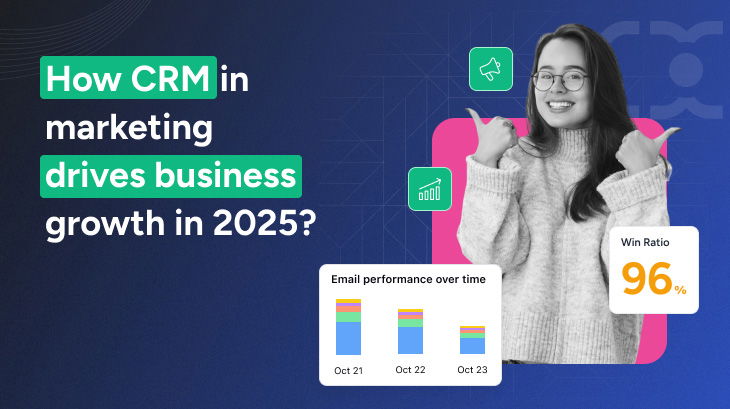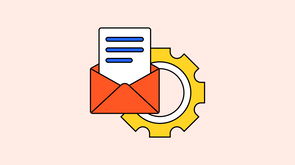Key Takeaways
- CRM system centralizes your lead and customer data to help marketing teams create highly targeted, personalized campaigns.
- You can define high-value leads with a scoring feature and then further do segment targeting.
- CRM with omnichannel communication features helps to enhance your customer experience and build brand awareness.
- AI, automation, and analytics in CRM can significantly help marketers improve their campaign strategy.
Imagine someone visiting your website, showing interest in a product, and later interacting with your brand on social media.
With CRM in marketing, all of these interactions are tracked and connected, so when they reach out for more information, there's no need to start from scratch. Your team has a complete picture, making it easy to respond in a personal and relevant way.
This approach has a real impact—studies show that businesses using CRM experience up to a 300% increase in lead-to-sales opportunity conversion rates.
CRM (Customer Relationship Management) helps create a seamless experience for everyone who interacts with your brand, from the very first point of contact to their ongoing journey with you.
This blog resource will walk you through what CRM means in marketing, its benefits, and how to leverage it to the fullest.
Let's first be familiar with the meaning of CRM in marketing.
What is CRM in marketing?
In marketing, CRM technology helps build personalized and targeted campaigns by providing insights into your target audience's interactions, journeys they take, and potential needs.
The CRM software tracks each interaction and offers key tools to let your marketing team nurture connections and create impactful campaigns.
For instance, a prospect shows interest in your SaaS product by signing up for a BoFu (Bottom of the funnel) resource like a one-on-one comparison guide.
The CRM will track this interaction, allowing your team to indicate upcoming possible interactions, like a welcome email or follow-up text with tailored content that addresses their needs for winning an opportunity.
Here's a simple flow of how CRM fits into your marketing funnel:
- Top of the funnel (Awareness stage): The CRM can capture potential interactions—like website visits or social media clicks—so that your marketing team can engage early on.
- Middle of the funnel (Consideration): Further, it helps you send personalized marketing emails based on interest, focusing on those most likely to convert.
- Bottom of the funnel (Decision): The CRM tracks which messages or offers lead to conversions, guiding teams for timely follow-ups that push decisions.
- Post-purchase (Retention): CRM helps in keeping customers engaged after the sale via personalized recommendations and loyalty programs.
In all, CRM in marketing means putting all your lead and customer info in one place to leverage it for effective targeting, boosting lead generation, and brand building.
Moving on to discuss the importance of CRM in marketing.
Why is the use of CRM in marketing beneficial?
CRM in marketing helps teams, making lead generation, personalization, and brand-building more effective.
Let's learn the key benefits of CRM in marketing:
1. Enhanced personalization and customer experience
In the digital era, people love or remember those businesses that can deliver personalized experiences; that's why brands like Amazon and Nike stand out.
A survey found that 55% of marketers believe personalization enhances visitor engagement and improves the customer experience.
CRM tracks each interaction, enabling hyper-personalized triggered emails and follow-ups that improve customer engagement.
2. Increased marketing efficiency with automation
CRM automation streamlines repetitive tasks, freeing your marketing team to focus on strategy building and creativity front.
Beyond saving time, CRM with marketing automation standardizes marketing outreach for consistent, targeted campaigns.
This way, your team can set a consistent messaging system across channels, making the overall process smoother and error-free.
3. Higher customer retention and loyalty
CRM enhances customer retention by enabling targeted engagement based on purchase history, preferences, and behavior. Loyal customers cost less to retain than acquiring new ones, and even a 5% increase in retention can raise profits by as much as 95%.
A CRM can automatically trigger loyalty offers or re-engagement messages, improving the likelihood of repeat purchases and making customers feel valued.
Learn more: 6 Techniques for better customer retention that just work!
4. Actionable insights for data-driven decisions
RM systems provide real-time campaign performance data, enabling marketing teams to build effective targeting strategies or optimize one with deep customer behavior and engagement trends.
For instance, CRM analytics revealing that certain segments respond better to social media will be a good indication to make your efforts there, making campaigns more effective and boosting ROI.
5. Improved ROI and lead conversion rates
With CRM, every interaction is tracked and organized, so you gain valuable insights into who your regular buyers are, what industries they represent, and even which products or services resonate most.
These data insights will guide you in allocating resources and efforts more mindfully, driving conversion rates, and improving ROI.
From our latest: AI for marketing automation: Revolutionize your strategy.
What is the role of CRM in marketing - Key functions
There are numerous roles a CRM in marketing, from getting more leads, helping you craft personalized messages, perform segmented targeted, and the below discussion covers all:
1. Capturing and centralizing contact data
Many CRM software comes with built-in lead-generation tools, such as web forms, landing pages, and chatbots, to capture data directly from visitors.
These tools help you gather essential information like contact details, company size, and areas of interest, enabling your team to qualify leads and engage prospects right from the start.
Further, it centralizes all your contact data from diverse sources, auto-enriches profiles, and offers a 360-degree view of the lead profile.
With this unified data, your marketing teams can initiate personalized interactions based on each contact's unique profile, ensuring a solid foundation for targeted campaigns.
2. Scoring high-priority leads
The lead scoring system within CRM software evaluates leads based on behavior (e.g., repeated visits to a specific product page or high email engagement) and prioritizes those most likely to convert.
CRM systems can analyze a lead's behavior, such as how often they've visited your site, opened emails, or clicked on offers. This allows you to rank, or "score," leads based on their engagement activities and likelihood to convert.
The below images show lead scoring by Salesmate CRM:
For personalized interactions, you can set email and text triggers if a prospect's score crosses a threshold (e.g., based on frequent website visits or email clicks).
Nowadays, AI is enabling predictive lead scoring within the CRM to make it more effective in determining the potential leads for the business.
3. Segmenting prospects, leads, and customers
CRM systems with data segmentation allow you to categorize your leads and customers based on key criteria, like demographics, behaviors, or past purchases.
This way, with the right segmentation, you could build tailored marketing messages that drive desirable results for you, be it driving website traffic, lead generation, demo signups, etc.
For example, if you're running an eCommerce business, you could create segments for first-time buyers, repeat customers, and inactive users.
First-time buyers might get a welcome discount, loyal customers get exclusive offers, and inactive users receive a re-engagement promo.
Related read: A Comprehensive Guide To Ecommerce Marketing Automation.
4. Automating workflows and campaigns
Automation within CRM platforms simplifies routine tasks, from triggering emails to scheduling social media posts.
This automation enhances efficiency and ensures timely and consistent communication, allowing marketing teams to scale their efforts and focus on strategy and creative aspects that drive growth.
For instance, CRM with marketing automation lets you set triggered emails based on your leads' browsing habits, making every interaction feel personal and relevant.
Also, you can set up automated chat journeys, helping your website visitors find information, answer questions, and move seamlessly toward conversion.
5. Tracking cross-channel customer interactions
If you're focused on improving your marketing impact, tracking customer interactions across all channels is essential.
With a CRM that integrates email, social media, website visits, and live chat, you get a complete view of your customer's journey.
This data lets you see where prospects are engaging most, which channels drive conversions, and how customers interact with your brand at each stage.
Insightful read: 23 Best live chat (webchat) software for websites.
6. Monitoring campaign performance
With the CRM analytics feature, marketers can see how campaigns perform in real time, allowing them to tweak messages, timing, or offers for optimal results.
For instance, if your email campaign is underperforming, CRM data may show low open rates, prompting the team to adjust the subject line or timing for improved engagement.
Here's what the email campaign insights look like within Salesmate:
Note that having prompt access to data allows your marketing teams to be more agile and optimize marketing campaigns on the fly. So, adjustments can be made immediately when a campaign underperforms rather than waiting until the end.
7. Supporting seamless tool integration
Integration capabilities unify your diverse marketing activities within your CRM.
Most CRMs offer seamless integrations with essential tools to streamline your workflow, consolidate data, and enhance the customer experience.
For instance, prospects engaging on LinkedIn can be added to a nurturing email sequence, ensuring consistency across platforms.
Key tools commonly integrated with CRM:
You must look for the necessary integrations before investing in any CRM software, as this will let you connect your key business tools and ensure seamless data flow across channels.
Future trends in CRM marketing
These trends in CRM technology highlight how customer engagement will continue to evolve.
1. AI-driven personalization and predictive insights
AI helps CRM systems identify trends and analyze customer data to predict what customers might do next, making sending them relevant information at the right time easier.
AI also automates repetitive tasks, such as responding to customer queries through chatbots and improving marketing efforts by freeing up time for more strategic work.
This is why most CRMs are working to build dedicated AI functionality within their software. For example, we have Einstein AI in Salesforce and Sandy AI in Salesmate.
Insightful read: Explore the 14 AI CRM use cases for next-gen CRM success.
2. IoT integration for proactive customer engagement
With IoT, CRMs can gather real-time data directly from devices, helping businesses better understand how customers use products and giving them insights to personalize marketing and support.
For example, a wearable fitness device might trigger CRM insights, prompting targeted health tips or product recommendations.
Coca-Cola integrates IoT with its vending machines to track purchases and manage inventory, tailoring restocking to meet demand.
On the social side, modern CRMs can integrate with platforms like Instagram, Facebook, or Twitter, making engaging customers where they are easy.
This integration lets businesses respond to customer feedback instantly, stay on top of trends, and join the conversation as it happens.
3. Immersive experiences through AR and VR
AR and VR are opening up a new frontier for immersive customer experiences.
CRM systems that integrate AR and VR will enable brands to provide personalized, memorable experiences that can significantly boost customer satisfaction and loyalty.
For example, a CRM can use VR to show a virtual tour of a product, like trying on clothes virtually or seeing the real dimensions of a metal garage.
Brands like IKEA use this technology trend in their Place app, which allows customers to place furniture virtually in their homes, creating memorable, engaging experiences.
Similarly, L’Oreal uses virtual try-ons for makeup, gathering data on preferences to personalize future campaigns.
Salesmate CRM software - One-stop solution for growing teams
Salesmate can be your one-stop solution to streamline your entire business operations, covering sales, marketing, and customer support.
With powerful tools for every department, it has become one of the best-unified solutions for generating leads, growing sales, and resolving customer issues.
For marketing teams, Salesmate CRM Offers:
- Built-in lead capture tools: Web Forms, Live Chat, and Meeting Scheduler to engage and capture leads seamlessly.
- Lead Scoring Software: Prioritizes hot leads based on engagement, allowing teams to focus on high-potential prospects.
- Omnichannel Communication: Connect with leads and customers across various platforms to deliver a consistent experience.
- Lead Management & Tracking System: Manage your lead data and track engagement for personalized interactions.
- Lead Segmentation: This is for specific and account-based targeting.
- Email Campaign Software: Design and send customized email campaigns that engage your audience.
- Sandy AI: Your co-pilot to help you write emails, schedule meetings, and generate contact summaries.
- Text Messaging CRM: Communicate instantly and effectively with leads through SMS.
- Automation: Streamline repetitive tasks to focus on high-impact activities.
- Analytics: Access detailed metrics to measure campaign performance and optimize strategies.
For sales teams, sales pipeline management software simplifies deal tracking and sales force automation, automates follow-ups, and helps teams close deals faster.
Salesmate's real-time data and reporting features give sales reps the insights they need to prioritize potential customers and focus on high-impact opportunities.
These CRM tools and features empower sales and marketing teams to manage customer relationships more effectively, improve customer interactions, and drive business success.
Salesmate provides Ticketing Software for customer service teams that tracks customer complaints, automates responses, and monitors resolution times. This ensures that customers receive timely support, enhancing customer loyalty.
Our CRM platform integrates with 700+ business apps, is highly customizable, and has top rates on trusted review sites (G2 or Capterra).
If you want to establish a seamless buyer experience, Salesmate can be your co-partner!
Conclusion
CRM in marketing management isn’t just a tool—it’s a strategy that helps you build lasting customer relationships and maximize ROI.
By unifying your data, automating workflows, and personalizing interactions, CRM transforms how you connect with customers, from first contact to loyal advocate.
Frequently asked questions
1. What is the CRM model in marketing?
The marketing CRM model mainly focuses on how your marketing team can generate more leads, deliver hyper-personalized target campaigns, and optimize campaign strategies.
2. What is CRM in digital marketing, and what are its key benefits?
CRM in digital marketing is a tool to centralize data from your various online marketing efforts for effective targeting.
Here are the key benefits of CRM in digital marketing
- Centralized customer data for unified profiles
- Personalized campaigns based on behaviors and preferences
- Automated engagement across email and social channels
- Lead management and nurturing throughout the sales funnel
- Actionable insights for improving strategies and conversion rates
3. How can CRM systems improve customer engagement?
- Personalized communication: Creates tailored messages across channels, enhancing relevance.
- Proactive engagement: Sends targeted offers based on customer needs.
- Real-time satisfaction tracking: Quickly addresses feedback for better experiences.
- Data-driven segmentation: Groups customers for personalized interactions.
- Improved retention: Increases loyalty through consistent, relevant engagement.
4. What is marketing automation in CRM?
Marketing automation in CRM automates tasks like sending emails, nurturing leads, and managing social media. It allows marketing teams to:
- Focus on strategy by reducing manual tasks.
- Personalize campaigns at scale, improving engagement.
- Use lead scoring to prioritize high-potential leads.
5. What is CRM in service marketing?
CRM in service marketing helps businesses manage customer interactions, ensuring quick, personalized responses to inquiries. It tracks issues and automates responses, improving service quality and customer satisfaction while building stronger long-term relationships.
6. What should I look for when choosing a CRM for my marketing team?
To choose the right CRM for your marketing team, prioritize:
- Lead management tool as it enables you to capture, score, and nurture leads from multiple channels.
- Marketing automation to automate email campaigns, social media, and drip campaigns.
- Analytics and customizable dashboards for campaign ROI analysis.
- Integrations to connect seamlessly with existing tools.
- User-friendly experience to boost team productivity.
- Data security with strong encryption and compliance.





![Follow up email template 15 Best follow up email templates [With best examples]](/mm-images/follow-up-email-template-iquligf6.webp?width=295)

Key Takeaways
Imagine someone visiting your website, showing interest in a product, and later interacting with your brand on social media.
With CRM in marketing, all of these interactions are tracked and connected, so when they reach out for more information, there's no need to start from scratch. Your team has a complete picture, making it easy to respond in a personal and relevant way.
This approach has a real impact—studies show that businesses using CRM experience up to a 300% increase in lead-to-sales opportunity conversion rates.
CRM (Customer Relationship Management) helps create a seamless experience for everyone who interacts with your brand, from the very first point of contact to their ongoing journey with you.
This blog resource will walk you through what CRM means in marketing, its benefits, and how to leverage it to the fullest.
Let's first be familiar with the meaning of CRM in marketing.
What is CRM in marketing?
In marketing, CRM technology helps build personalized and targeted campaigns by providing insights into your target audience's interactions, journeys they take, and potential needs.
The CRM software tracks each interaction and offers key tools to let your marketing team nurture connections and create impactful campaigns.
For instance, a prospect shows interest in your SaaS product by signing up for a BoFu (Bottom of the funnel) resource like a one-on-one comparison guide.
The CRM will track this interaction, allowing your team to indicate upcoming possible interactions, like a welcome email or follow-up text with tailored content that addresses their needs for winning an opportunity.
Here's a simple flow of how CRM fits into your marketing funnel:
In all, CRM in marketing means putting all your lead and customer info in one place to leverage it for effective targeting, boosting lead generation, and brand building.
Moving on to discuss the importance of CRM in marketing.
Why is the use of CRM in marketing beneficial?
CRM in marketing helps teams, making lead generation, personalization, and brand-building more effective.
Let's learn the key benefits of CRM in marketing:
1. Enhanced personalization and customer experience
In the digital era, people love or remember those businesses that can deliver personalized experiences; that's why brands like Amazon and Nike stand out.
A survey found that 55% of marketers believe personalization enhances visitor engagement and improves the customer experience.
CRM tracks each interaction, enabling hyper-personalized triggered emails and follow-ups that improve customer engagement.
2. Increased marketing efficiency with automation
CRM automation streamlines repetitive tasks, freeing your marketing team to focus on strategy building and creativity front.
Beyond saving time, CRM with marketing automation standardizes marketing outreach for consistent, targeted campaigns.
This way, your team can set a consistent messaging system across channels, making the overall process smoother and error-free.
3. Higher customer retention and loyalty
CRM enhances customer retention by enabling targeted engagement based on purchase history, preferences, and behavior. Loyal customers cost less to retain than acquiring new ones, and even a 5% increase in retention can raise profits by as much as 95%.
A CRM can automatically trigger loyalty offers or re-engagement messages, improving the likelihood of repeat purchases and making customers feel valued.
4. Actionable insights for data-driven decisions
RM systems provide real-time campaign performance data, enabling marketing teams to build effective targeting strategies or optimize one with deep customer behavior and engagement trends.
For instance, CRM analytics revealing that certain segments respond better to social media will be a good indication to make your efforts there, making campaigns more effective and boosting ROI.
5. Improved ROI and lead conversion rates
With CRM, every interaction is tracked and organized, so you gain valuable insights into who your regular buyers are, what industries they represent, and even which products or services resonate most.
These data insights will guide you in allocating resources and efforts more mindfully, driving conversion rates, and improving ROI.
What is the role of CRM in marketing - Key functions
There are numerous roles a CRM in marketing, from getting more leads, helping you craft personalized messages, perform segmented targeted, and the below discussion covers all:
1. Capturing and centralizing contact data
Many CRM software comes with built-in lead-generation tools, such as web forms, landing pages, and chatbots, to capture data directly from visitors.
These tools help you gather essential information like contact details, company size, and areas of interest, enabling your team to qualify leads and engage prospects right from the start.
Further, it centralizes all your contact data from diverse sources, auto-enriches profiles, and offers a 360-degree view of the lead profile.
With this unified data, your marketing teams can initiate personalized interactions based on each contact's unique profile, ensuring a solid foundation for targeted campaigns.
2. Scoring high-priority leads
The lead scoring system within CRM software evaluates leads based on behavior (e.g., repeated visits to a specific product page or high email engagement) and prioritizes those most likely to convert.
CRM systems can analyze a lead's behavior, such as how often they've visited your site, opened emails, or clicked on offers. This allows you to rank, or "score," leads based on their engagement activities and likelihood to convert.
The below images show lead scoring by Salesmate CRM:
For personalized interactions, you can set email and text triggers if a prospect's score crosses a threshold (e.g., based on frequent website visits or email clicks).
Nowadays, AI is enabling predictive lead scoring within the CRM to make it more effective in determining the potential leads for the business.
3. Segmenting prospects, leads, and customers
CRM systems with data segmentation allow you to categorize your leads and customers based on key criteria, like demographics, behaviors, or past purchases.
This way, with the right segmentation, you could build tailored marketing messages that drive desirable results for you, be it driving website traffic, lead generation, demo signups, etc.
For example, if you're running an eCommerce business, you could create segments for first-time buyers, repeat customers, and inactive users.
First-time buyers might get a welcome discount, loyal customers get exclusive offers, and inactive users receive a re-engagement promo.
4. Automating workflows and campaigns
Automation within CRM platforms simplifies routine tasks, from triggering emails to scheduling social media posts.
This automation enhances efficiency and ensures timely and consistent communication, allowing marketing teams to scale their efforts and focus on strategy and creative aspects that drive growth.
For instance, CRM with marketing automation lets you set triggered emails based on your leads' browsing habits, making every interaction feel personal and relevant.
Also, you can set up automated chat journeys, helping your website visitors find information, answer questions, and move seamlessly toward conversion.
5. Tracking cross-channel customer interactions
If you're focused on improving your marketing impact, tracking customer interactions across all channels is essential.
With a CRM that integrates email, social media, website visits, and live chat, you get a complete view of your customer's journey.
This data lets you see where prospects are engaging most, which channels drive conversions, and how customers interact with your brand at each stage.
6. Monitoring campaign performance
With the CRM analytics feature, marketers can see how campaigns perform in real time, allowing them to tweak messages, timing, or offers for optimal results.
For instance, if your email campaign is underperforming, CRM data may show low open rates, prompting the team to adjust the subject line or timing for improved engagement.
Here's what the email campaign insights look like within Salesmate:
Note that having prompt access to data allows your marketing teams to be more agile and optimize marketing campaigns on the fly. So, adjustments can be made immediately when a campaign underperforms rather than waiting until the end.
7. Supporting seamless tool integration
Integration capabilities unify your diverse marketing activities within your CRM.
Most CRMs offer seamless integrations with essential tools to streamline your workflow, consolidate data, and enhance the customer experience.
For instance, prospects engaging on LinkedIn can be added to a nurturing email sequence, ensuring consistency across platforms.
Key tools commonly integrated with CRM:
You must look for the necessary integrations before investing in any CRM software, as this will let you connect your key business tools and ensure seamless data flow across channels.
Future trends in CRM marketing
These trends in CRM technology highlight how customer engagement will continue to evolve.
1. AI-driven personalization and predictive insights
AI helps CRM systems identify trends and analyze customer data to predict what customers might do next, making sending them relevant information at the right time easier.
AI also automates repetitive tasks, such as responding to customer queries through chatbots and improving marketing efforts by freeing up time for more strategic work.
This is why most CRMs are working to build dedicated AI functionality within their software. For example, we have Einstein AI in Salesforce and Sandy AI in Salesmate.
2. IoT integration for proactive customer engagement
With IoT, CRMs can gather real-time data directly from devices, helping businesses better understand how customers use products and giving them insights to personalize marketing and support.
For example, a wearable fitness device might trigger CRM insights, prompting targeted health tips or product recommendations.
Coca-Cola integrates IoT with its vending machines to track purchases and manage inventory, tailoring restocking to meet demand.
On the social side, modern CRMs can integrate with platforms like Instagram, Facebook, or Twitter, making engaging customers where they are easy.
This integration lets businesses respond to customer feedback instantly, stay on top of trends, and join the conversation as it happens.
3. Immersive experiences through AR and VR
AR and VR are opening up a new frontier for immersive customer experiences.
CRM systems that integrate AR and VR will enable brands to provide personalized, memorable experiences that can significantly boost customer satisfaction and loyalty.
For example, a CRM can use VR to show a virtual tour of a product, like trying on clothes virtually or seeing the real dimensions of a metal garage.
Brands like IKEA use this technology trend in their Place app, which allows customers to place furniture virtually in their homes, creating memorable, engaging experiences.
Similarly, L’Oreal uses virtual try-ons for makeup, gathering data on preferences to personalize future campaigns.
Salesmate CRM software - One-stop solution for growing teams
Salesmate can be your one-stop solution to streamline your entire business operations, covering sales, marketing, and customer support.
With powerful tools for every department, it has become one of the best-unified solutions for generating leads, growing sales, and resolving customer issues.
For marketing teams, Salesmate CRM Offers:
For sales teams, sales pipeline management software simplifies deal tracking and sales force automation, automates follow-ups, and helps teams close deals faster.
Salesmate's real-time data and reporting features give sales reps the insights they need to prioritize potential customers and focus on high-impact opportunities.
These CRM tools and features empower sales and marketing teams to manage customer relationships more effectively, improve customer interactions, and drive business success.
Salesmate provides Ticketing Software for customer service teams that tracks customer complaints, automates responses, and monitors resolution times. This ensures that customers receive timely support, enhancing customer loyalty.
Our CRM platform integrates with 700+ business apps, is highly customizable, and has top rates on trusted review sites (G2 or Capterra).
If you want to establish a seamless buyer experience, Salesmate can be your co-partner!
Conclusion
CRM in marketing management isn’t just a tool—it’s a strategy that helps you build lasting customer relationships and maximize ROI.
By unifying your data, automating workflows, and personalizing interactions, CRM transforms how you connect with customers, from first contact to loyal advocate.
Frequently asked questions
1. What is the CRM model in marketing?
The marketing CRM model mainly focuses on how your marketing team can generate more leads, deliver hyper-personalized target campaigns, and optimize campaign strategies.
2. What is CRM in digital marketing, and what are its key benefits?
CRM in digital marketing is a tool to centralize data from your various online marketing efforts for effective targeting.
Here are the key benefits of CRM in digital marketing
3. How can CRM systems improve customer engagement?
4. What is marketing automation in CRM?
Marketing automation in CRM automates tasks like sending emails, nurturing leads, and managing social media. It allows marketing teams to:
5. What is CRM in service marketing?
CRM in service marketing helps businesses manage customer interactions, ensuring quick, personalized responses to inquiries. It tracks issues and automates responses, improving service quality and customer satisfaction while building stronger long-term relationships.
6. What should I look for when choosing a CRM for my marketing team?
To choose the right CRM for your marketing team, prioritize:
Sonali Negi
Content WriterSonali is a writer born out of her utmost passion for writing. She is working with a passionate team of content creators at Salesmate. She enjoys learning about new ideas in marketing and sales. She is an optimistic girl and endeavors to bring the best out of every situation. In her free time, she loves to introspect and observe people.